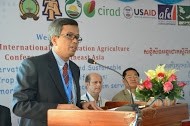
[as prepared for delivery]
Your Excellency Youk Ngoy, Secretary of State, Ministry of Education, Youth and Sport
Your Excellency Dr. Touch Visalsok, Under Secretary of State, Ministry of Education, Youth and Sport
Excellencies, distinguished guests, ladies and gentlemen
Good morning
It is my great pleasure to welcome all of you today to Battambang for the Fourth International Conservation Agriculture Conference in Southeast Asia. USAID is pleased to be able to provide support for this important regional event and hopes it will lay the ground work for further consultations, future research, and fruitful discussions on conservation agriculture.
The world is facing a number of challenges. These include ever increasing divides between the rich and the poor, rapid population growth, and urbanization. We are all also affected by increasingly extreme weather and environmental conditions caused by climate change as well as poor management of natural resources. Poverty, food insecurity, and hunger remain widespread across the globe. We are here today to help address the fact that almost 1 billion people across the globe go to bed hungry every night. To meet the needs of a world population expected to reach 9 billion by 2050, agricultural production will need to increase by at least 60 percent.
There is a strong consensus that agriculture plays a crucial role in any effort to reduce global poverty and hunger. Studies suggest that every one percent increase in agricultural income per capita reduces the number of people living in extreme poverty by between 0.6 and 1.8 percent.
The U.S. government, through the President’s global food security initiative known as “Feed the Future,” strives to increase agricultural production and the incomes of both men and women in rural areas who rely on agriculture for their livelihoods. Feed the Future investments aim to improve agricultural productivity, expand markets and trade, and increase the economic resilience of vulnerable rural communities.
In Cambodia, 80 percent of the population lives in rural communities and approximately 70 percent of all Cambodians rely on some form of agriculture - whether cropping, fish-farming, capture fisheries, or forestry for their livelihoods.
This is why agriculture holds the greatest potential to be the engine for economic growth, for poverty reduction, and for food security for most Cambodians and their neighbors in Southeast Asia. While the sector faces a number of issues such as low productivity, inadequate post-harvest infrastructure, an unfavorable business environment, and limited financial services to reach rural entrepreneurs, your efforts are making a difference.
In Cambodia, the Feed the Future strategy supports Cambodia’s own development goals and objectives for improving the well-being of the rural poor. For example, USAID Cambodia’s efforts through our HARVEST program are working to increase agricultural incomes for 70,000 rural households and diversify cropping systems for 31,500 households. Our work includes developing agricultural solutions to a variety of challenges, including poor agricultural productivity, postharvest losses, food safety, lack of market and financial access, environmental degradation, and the effects of climate change.
Your work here and beyond this conference on conservation agriculture is critical not only for sustainably improving agriculture production and productivity but also for preserving the environment. USAID is pleased to have provided support to the Feed the Future Innovation Lab for Collaborative Research on Sustainable Agriculture and Natural Resource (SANREM). Together with our partners - North Carolina Agricultural and Technical State University in collaboration with the Ministry of Agriculture, Forestry, and Fisheries, the Royal University of Agriculture, the University of Battambang, the French Agricultural Research Centre for International Development, and other local and regional institutions - we look forward to the results of your collaboration.
Through Feed the Future, the United States is committed to addressing global hunger and food insecurity through improved collaboration and the application of knowledge. Today’s conference is an example of that commitment. The information to be shared this week by researchers and experts from local and regional institutions about conservation agriculture production will be truly beneficial for all our efforts. It will help bring about new and improved scientific technologies while highlighting proven best practices in conservation agriculture. I know and hope everyone here will benefit from these valuable presentations and discussions.
Thank you!
Related Speeches
- Remarks by Polly Dunford, Mission Director, USAID Cambodia, Launch Event of Feed the Future Cambodia Harvest II
- Remarks by Christina Lau, Deputy Director, Office of Public Health and Education, USAID/Cambodia, Opening Ceremony of the Kick-Off Workshop for “One Health Workforce”
- Remarks by Veena Reddy, Deputy Mission Director, USAID Cambodia, EPIC Showcase







Comment
Make a general inquiry or suggest an improvement.